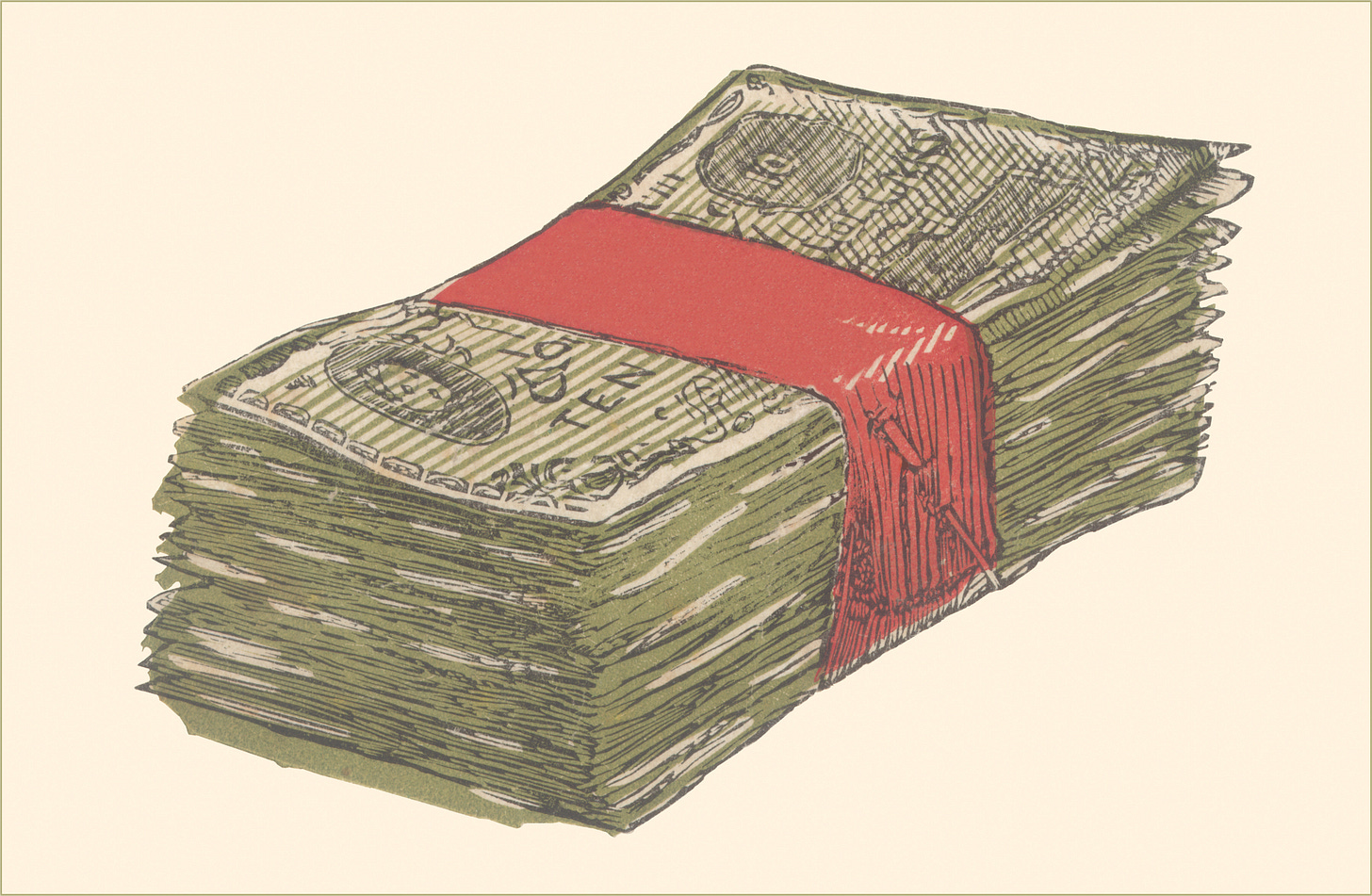Stocks Aren't Salvation
Political consequences of the ownership society
The stock market is doing well. Spectacularly well! In the past five years, the S&P 500 has nearly doubled. It rose more than 20% in each of the past two years, and has doggedly continued to rise to double-digit gains this year in spite of our political chaos. The tech-heavy Nasdaq has done even better. It is—for now—a great time to be an American investor.
Unsurprisingly, people who own stocks feel better about the economy than their stockless peers. “Sentiment among people who don’t own stocks is at the lowest level on a three-month moving average since the university began tracking it in 1998,” the Wall Street Journal reports today—but that is not true of large stockholders, who are basking in a collective gain of tens of trillions of dollars in wealth since the beginning of the pandemic. The paper notes that 87% of stocks are owned by the top 20% of earners, but even that understates the concentration of stock ownership: fully half of all stocks are owned by the top 1% wealthiest people in America.
It is easy to see why this particular sort of inequality is unhealthy for our society. It creates an unbridgeable gap between different segments of the population in terms of their economic perception and reality. Even for staunch capitalists, who would like to argue that what is good for Wall Street is good for Main Street, this is a problem. If too few people are experiencing the wonderful gains that the stock market produces, it is going to be difficult to convince everyone that the current economic arrangement is in their interests. That dissatisfaction can be diverted with things like religion and propaganda and NFL football to a certain degree, but over time, it becomes a threat to the basic stability of the system.
People without stocks (or without enough stocks to make a significant difference in their finances) make most of their income from wages. Their experience of corporations, therefore, comes as workers, and as consumers. The “rising tide lifts all boats” argument about how good time for corporations lead to good times for all of us is going to be smashed on the rocks of these people’s lived experience. It’s not necessary to list out all the ways that companies screw people over in order to demonstrate this. All you have to understand is the basic incentives of capitalism, which guide corporate behavior.
Boom times for corporations would, in theory, raise wages if there were strong competition in the market—but corporations do everything in their power to eliminate that competition. They trend always towards monopoly. And the rising value of corporations would, in theory, tend to enrich workers if they had strong unions to ensure that they shared in the gains—but corporations do everything in their power to crush unions and labor power in general at every turn. The natural incentive for a corporation, the goal that wins the game of capitalism, is a 100% market share and labor costs of zero. Companies don’t get there, but that is where they aim. The money a company makes must be shared between managers, investors, workers, and taxes. The way that American investor capitalism works is that the managers are paid enough to manage the company in a way that funnels the maximum possible share of the money to the investors and the lowest possible share to the workers, and then the larger political project of companies is to minimize the tax share. Crucially, these incentives do not change when companies make a lot of money. There is no level of profit that causes a company or its investors to suddenly become altruistic. Simply grasping this basic set of incentives explains the majority of our nation’s political economy!
On both sides of the aisle (that separates center-left capitalists from center-right capitalists), there has long been at least a theoretical appetite to spread stock ownership more widely. Some advocates of this are motivated by genuine concern about economic inequality, and some by enlightened self-interest that tells them it is a wise investment in preventing social meltdown and pacifying populism’s hot flashes. We will call this vision “the ownership society.” There are many policies that could promote this goal: Tax-advantaged stock ownership accounts for kids, direct stock grants to employees or to citizens, sovereign wealth funds that own stocks collectively and distribute the gains to everyone, etc. They all, in various ways, aim to broaden the pool of people who share in the stock market’s gains, thereby bolstering the wealth of the average person, and also serving to align the economic interests of the average person with the interests of corporations. (There are also fully nefarious varieties of these policies, like the current plan to allow regular people to invest their retirement savings in private assets, which are motivated only by Wall Street’s desire to have a pool of suckers who will soak up low-quality investments.)
In a vacuum, the ownership society sounds nice. Stock ownership is extremely concentrated among the rich right now, and that is a significant contributor to the crisis of economic inequality, and if stock ownership were shared more broadly, inequality might be lessened, and more people would share in the economic gains that corporate America produces. Indeed, this market-based path out of inequality is the entire centrist philosophical lane, broadly speaking. The majority of the Democratic Party is in this lane. The idea is that American capitalism is a wonderful machine for producing prosperity; the essential task is to see to it that that prosperity is shared more widely than it currently is; and broadening stock ownership is a straightforward way to do so. And hell, even I, a socialist, am happy to admit that this would be better than what we have now.
There are, however, some serious political consequences that would result from adopting this as our preferred method of reform. The more stock you own, the more your own economic incentives become tied to rising stock prices. This implies that your incentives also are for: lower workers wages at the companies, less government regulation of the companies, lower corporate taxes, and other corporate-friendly policies. As the amount of stock you own rises in importance relative to your own wage income, you may find yourself in the odd place of being incentivized for both higher wages for yourself, and lower wages for all of your fellow workers of the world. I have written previously about how this dynamic can trip up labor pension funds, but a more familiar example of it is probably just watching a once-cool person you know slowly become a Republican as their stock portfolio grows.
Think about the underlying goal that the ownership society purports to be trying to accomplish: To increase economic equality, to increase economic opportunity for all, to ensure that economic prosperity accrues to all rather than being captured by a small minority of wealthy people. Does broader stock ownership accomplish that? To some degree yes—but it brings with it the negative externality of “furthering corporate America’s goal of total domination of our political system in service of corporate profits, right up until the world is destroyed by the climate crisis and the massive international instability that corporate domination has caused.” I mean, that is a significant externality. This is a thing that has to be included in broad economic policy discussions. The stock market going up does not account for everything.
Now, what if I told you that there is another way to accomplish the underlying goals of the ownership society, without at the same time encouraging a larger portion of the public to think warmly about corporate domination of our politics? Good news: there is, in fact, a way to share corporate profits widely without requiring everyone to own a company’s stock. It is called taxes. Yes! Once the companies make the money, you tax it, and then you use those taxes for the public good. Note the difference: While broadening stock ownership tends to incentivize public support for lower corporate taxes, taxing companies in service of the public good tends to incentivize public support for higher corporate taxes. This also applies to corporate regulation. Whereas large shareholders of Amalgamated Chemical Corp may prefer that there not be environmental regulations like “don’t dump your poisonous runoff in the river,” because such regulations lower the company’s profits, the zealous application of such regulation clearly accrues to the public good in a way that would tend to increase public support for it—support that might be eroded by large-scale efforts to make every member of the public think like a shareholder rather than a citizen.
This also applies to labor rights.
Companies are private entities. They serve their own interests. The public good is public. It is for everyone. While it is admirable to want to decrease economic inequality, it is, ultimately, convoluted and counterproductive to try to do so by encouraging everyone to think of the corporate good as the public good. It’s not the same thing.
If you have thought of yourself as an advocate of the ownership society for pure reasons, I salute your wish for a fairer economy. But think about this: Through wise taxation, regulation focused on the public good, and strong labor rights to empower unions, you get all of the benefits that the ownership society wants to produce without corporate decimation of our democracy and without the need to have centibillionaires in the world. Wow! Good stuff. It’s fine to have your little index funds in your retirement fund in order to avoid having to eat dog food when you are old but that doesn’t mean it is smart to organize our entire society around corporate profits. Corporations are good at doing the one thing they do but if you don’t watch out we all end up serving them and not vice versa.
More
Related reading: Capitalism’s Washing Machine; Corporations Do Not Have Any Rights That We Don’t Give Them; The Failure of Warren Buffett; Privatized America.
I wrote a book about the labor movement called “The Hammer” which you might enjoy if you are interested in the distribution of power in our political economy. You can order it from an independent bookstore here. I also have signed copies available for $40 via PayPal, in which I will write something nice or even “wacky,” at your request. Email me.
SUPPORT INDEPENDENT MEDIA HAIKU:
My paid subscribers
Warm-hearted people who are
Looking mighty fine.
—————————————-
If you like reading this site and want to help us keep on rolling, take a quick second and become a paid subscriber now. Cheap and it feels good!




I know an even better way to ensure mass participation in the profits of companies- democratic ownership of the companies by their employees. There must be a name for a system like that.
I’ve been thinking about the stock market a lot recently and this was excellent. There could be a lot more here